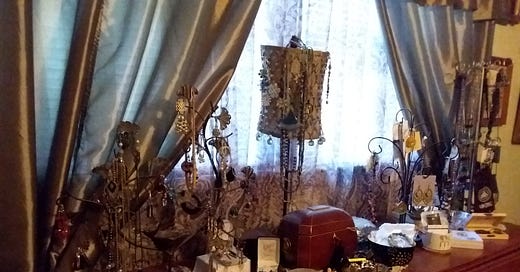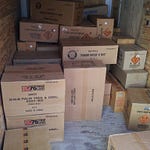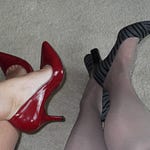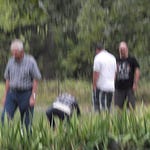This is a light-hearted post about a common affliction, i.e., having too much stuff. We get bigger homes so we have enough room for our stuff, only to fill the larger spaces with more stuff. Having a stuff-filled life presents a challenge to wrangle all of that excess.
Note about the image: This is a portion of my jewelry collection. Not included is a wall organizer and a jewelry cabinet.
My Mysterious Mind
My husband and I have lived in the same four-bedroom home for 29 years. We launched three children from this place and soon they will all visit simultaneously, bringing their three spouses, and five children with them, two of which are babies. In the nearly three decades we have lived here, there have never been so many people staying here at once, not even during a child’s sleepover. Including my husband and I, there will be thirteen people eating and sleeping here for a few days. They will bring with them their eleven suitcases and we will need two pack-and-plays.
We are very excited to be together in the home from which our children launched. The problem is the accumulated stuff in the way. I am a pack-rat, powered by the “what if we need this someday?” operating system. Neither my husband nor I have a military background; thus, we are not ready to pack up and ship out quickly. Our home is not minimalist-decorated or stream-lined for departure. I cherish my collection of memories and the things to which they are attached.
Before you call a reality TV program to report me as a hoarder, I assure you our situation isn’t THAT pathetic. (Or am I in denial?) At any rate, I have been vigorously de-cluttering in preparation for a more peaceful concurrent occupation of thirteen people. Our garage is full of items destined to be donated. Our dining room is cluttered with items headed to our cabin at Mystery Acres, things stored here during the installation of wall and floor coverings. And, despite all of this, I realize I could de-clutter with this intensity for months instead of just a few weeks. How did it get this bad?
Have you taken the Strengths Finder? This assessment identifies a person’s top strengths from a set of over 30 possibilities. One of my top five is Input; I am a collector. I enjoy gathering new experiences, new relationships, and things that interest me. I have a collection of sand from beaches and other strange places I have visited, like the side of a road in rural New Mexico and a rest area in South Dakota. I also collect jewelry and colorful scarves. My friends marvel at how I can find so many different things about which to write; but I collect ideas, continuously. Thankfully, ideas don’t take up space in my home.
At my previous university I was known as the Archivist. If someone needed an obscure copy of some document, I probably had it in a file folder on my computer. Surprisingly, I could actually find it quickly. My favorite poster from my very first office said, “Geniuses are rarely tidy.” Sadly, I have no idea where it is.
Which brings me back to the problem with stuff, my problem with stuff. It goes against my nature to get rid of things. But I am motivated, at least for the next few weeks, because I want my family members to have space for themselves and their things. Having a path to a bed just isn’t good enough, there needs to be floor space for their suitcases, and those pack-and-plays.
Message from Mystery Acres
Before my husband and I purchased our 17.5 acres of forest, we had visited many remote places in search of the right land for us. Driving in rural areas I observed the cluttered way some people live. With room outside of their homes and out-buildings to just put stuff, many places looked junky. I told my husband I didn’t want our place to be like that.
Old machinery, dilapidated campers, and rundown dog kennels are just a few of the forms of debris accumulating in the country. All of this clutter destroys the view of nature’s decorating. I don’t mind an undisciplined field of wildflowers and grasses, but an ugly pile of deteriorating man-made chaos, that’s unacceptable to me. I like my plastic, metal, and synthetics organized in buildings or tubs, not visible. And I especially dislike plastic shopping bags, particularly when they are hanging from tree branches or caught on bushes along the side of the road.
Mystery Acres’ voice calls for humans to better manage their stuff. Reuse, reduce, and recycle are specific ways to manage excessive debris. Reusable shopping bags can replace plastic ones. Aluminum cans can be readily recycled instead of cluttering landfills. And plastic water bottles can be refilled or recycled. Putting trash in trash cans doesn’t make it go away, just puts it somewhere else, out of sight.
The message of Mystery Acres is that nature’s disorder is beautiful, while human disorder is not. Escaping to the forest doesn’t work if clutter follows you there. We could buy less stuff, reuse or donate the stuff we have, and recycle what can be recycled.
Ancient Mystery’s Voice
“Abram and his family left for Canaan with all the possessions they had accumulated.” (See Genesis 12:5)
For thousands of years, people have been moving and taking a lot of stuff with them. In the twelfth chapter of the first book of the Bible, Abram moved from his homeland to the land of Canaan. The possessions he took with him included people “who had joined them,” probably servants or slaves, family members, and wealth.
Several aspects of this bit of scripture intrigue me. First, Abram didn’t have a rummage sale or leave a bunch of stuff behind; he and his family took “all of the possessions they had accumulated.” Maybe Abram had Input as a strength, just like me? He didn’t know what he might need in the new land, so he took everything and everybody with him. He didn’t downsize before leaving. I suspect he just did what humans naturally do; they collect stuff and keep it all.
Second, I am curious about the word “possessions,” alternatively translated as “substance.” This group of people were moving across the countryside with a bunch of stuff around them. They didn’t “travel light” or “keep a small footprint.” This behavior is in sharp contrast to what Jesus advised His disciples to do. He told them not to bring gold, silver, or even a bag of extra clothes (see Matthew 10, verses 9 and 10). Abram is credited for having great faith when He did as the Lord directed him, leaving his home for a strange land (see Hebrews 11, verse 8). Even greater faith was required of the disciples, to travel with nothing but the clothes on their backs.
Lastly, I am pondering the word “accumulated,” which is often translated as “gathered.” Abram, like the rest of us, had built up a collection of stuff. His stuff, like mine, just accumulated. And, even when he left his home, he took it all with him. Some people get rid of stuff when they move. Abram didn’t do that, and I haven’t had to.
I find comfort in this little story about Abram, great man of faith. He, like me, had trouble letting go of his stuff. His pack-rat nature didn’t disqualify him as being someone who trusted in God. He just thought it best to keep his possessions with him. I wonder if he de-cluttered after he moved into the new land, asking himself why he thought he needed to bring everything?
Living in Mystery
What does it mean to live in the mystery of wrangling excessive stuff? First, it means differentiating between essential and non-essential stuff. Through World Vision, My husband and I sponsor three children in remote villages in underdeveloped countries. Every year we have the opportunity to send an extra financial gift so the child and their family can go shopping at a special market. After a few months we will receive a photo and letter from each child, detailing the purchases. Usually the acquisitions are clothes and school supplies. One time we received a photo of a smiling boy, standing with his father, a bag of feed, and a goat. Never do the photos include recreational or decorative items.
That’s because food, education, and clothing are more important than toys, games, and décor. On a scale of human survival, the sources of beauty and entertainment are a lower priority. Note that I said “lower,” not unimportant. If your standard of living allows you to spend time and money on beauty and/or recreation, you are experiencing an abundance beyond basic survival. Before bringing something into your life, ask yourself, “Is this meeting a basic need or an advanced need?” If you answer the latter, the follow-up reflection is to consider, “Am I willing to provide space in my home and life for it?” Non-essential things cost more than money; they also cost space and long-term care. In addition, your mind contains a cognitive file on everything you own; having too many things creates mental clutter as well as physical. Thus, living in the mystery of wrangling excessive stuff involves decreasing the non-essential things entering your home, life, and mind.
Second, living in the mystery of wrangling excessive stuff involves understanding the priority of relationships with things, animals, and people. In the developmental order of relationships, being connected to people is at the top, connections to animals is in the middle, and connecting to things is the lowest level of development. In other words, relationships with things are the easiest, while relating to a person requires the highest level of relationship maturity. Being attached to an animal, such as a pet, requires mid-level relationship maturation. Applying this development relationship order to yourself means thinking about how the things in your world affect your relationships with other people. Does the amount of stuff in your world interfere with the quality of relationships with people? My current de-cluttering effort is fueled by the motivation to create a less-cluttered space for my family members’ visit. Non-essential stuff has greater value if it enhances relationships with others. If the impact on relationships is detrimental, this stuff is getting in the way of a higher quality of life. Less stuff might mean better relationships.
Third, ask yourself: “Do I have stuff, or does my stuff have me?” If the stuff is in control it will “breed” and expand. In cleaning out my old office, I am shocked at the number of bracket clips of various sizes I have. Furthermore, I have accumulated countless folders, sticky note pads, and pens. I had a recent meeting with a publishing rep; she gave me three pens. Three! Doesn’t she know I already have several life-time supplies? It seems unethical to throw perfectly good office supplies into the trash.
Thus, I am trying to live with the “one in – one out” approach. After buying a new pair of shoes, I need to find a pair of shoes in my closet to donate or pitch. A friend gave me two bags of very nice, used clothing. For every piece I put into my closet I had to determine which item was coming out. Perhaps, before accepting those three pens I could have found three old pens to discard. Confession time: I am not going to be willing to do this with jewelry or scarves.
As an old mom to young parents, I invite you to reflect on stuff management in the lives of your children. Toys are so inexpensive, it’s easy to have enough for a day care center. But a child can really only play with one toy at a time. I have a “one-out-at-a-time” approach with children’s toys. If a child wants to play with a toy, all other toys must be put away first. This teaches a discipline of putting things away as we are finished with them. A meal isn’t complete until the kitchen is clean. A project isn’t finished until the tools and supplies are stored away. Every “thing” needs to have a “home” where it “lives,” only left out when being used. Children who are taught this habit when young find it much easier to manage their stuff as adults. Future college roommates and spouses will be grateful for a parent who taught their children stuff management.
Living in the mystery of managing excessive stuff involves a discipline of stopping nonessential stuff at the door, choosing relationships with people over those with things. It also means reducing the clutter in our lives, providing mental relief from the cognitive responsibility of stuff-care.
Connecting With Mystery
Dear Lord of All Mystery, I confess to clinging to things, resulting in an excess of stuff to manage. Help me to travel through life with less of a burden to drag with me, relying on You and not stuff. Thank You for providing just what I need for each day, including the courage to reduce the excess in my life. Amen.
Notes from Dr. Mac
If you want to do your own investigation of any of the scriptures I use, I suggest you go to Bible Gateway. This free online version of the Bible allows a search of words or phrases in various translations.
You can find previous posts and podcasts in my ARCHIVE and organized compilations in the My “Books” section. You can also find Mystery’s Voice on Spotify .
Do you have thoughts to share? Please leave a comment below or through the Substack App, or email me privately at Dear Dr. Mac. I love to hear from you!














Share this post